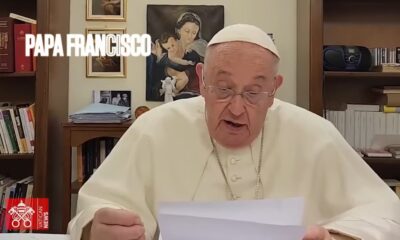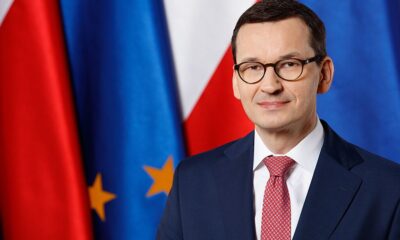Opinion
Jan Figel, The EU must not support a caretaker government in Bangladesh
Almost nine years ago, newly appointed EU foreign policy chief Federica Mogherini was being lauded for leading the world in standing up to the junta who usurped power away from the elected government in Thailand four months prior. Alongside the accolades came a foreboding warning: Once the military has its grip on power, it will not easily let it go. Specifically, it was suggested that the military will rewrite the constitution in such a way that its own grip on power will be built into the system in perpetuity.
As expected, the new constitution was promulgated in 2017, cementing the military’s powers. Much delayed elections were finally held in 2019, seeing the junta leader shed his uniform for a suit and tie to transition into Thailand’s new ‘civilian’ PM. Unfortunately, in the nine years which have transpired, the EU and much of the Western world have dropped sanctions and abandoned principle, returning to full cooperation with Thailand’s undemocratic government, choosing to take part in the charade rather than stand up for democracy.
In May of this year, a second election was held under the new constitution. This time, nine years after the coup d’Etat which swept the military into power, a landslide victory for pro-democracy parties Move Forward and Pheu Thai and a complete sidelining of the plain-clothed military political parties. Yet, as Nikkei Asia reports, three weeks after the elections, the pro-democracy coalition’s nominated PM is still in limbo while the powers that be deliberate whether to allow him to assume his rightful office.
In contrast, earlier this year the EU adopted further restrictive measures against leaders of the junta which usurped power in Thailand’s immediate neighbour to the West, Myanmar, in February 2021. One can only hope that the EU will not buckle in Myanmar as it has in Thailand and stay steadfast in its resolve to support the Burmese people in their aspiration for a fully democratic transition.
All eyes must now turn one more country to the West, with general elections scheduled in Bangladesh for January 2024. Following a highly criticized and disputed general election in 2018, Bangladesh’s main opposition party, Bangladesh National Party (BNP) and Islamist party Jamaat-e-Islami both demand the next elections be held under a caretaker government, at the threat of boycott. Veteran Bangladeshi PM of 15 years Sheikh Hasina has vowed never again to hand over power to an unelected body and has rejected this demand outright.
The last caretaker government was taken over by the military, extended its 90-day term and postponed elections by over two years from 2006-2008. Ironically, in full role-reversal, it was then-opposition Awami League (today’s ruling party)’s boycott of the 2006 elections which triggered the declaration of the State of Emergency and military intervention. Political leaders of all parties from across the political spectrum were jailed and indicted on various trumped-up charges by the caretaker government – a common practice by juntas designed to exclude popular political leaders from ever contesting future elections. In fact, both of BNP’s current co-leaders, Khaleda Zia and her son Tarique Rahman, are ineligible to run in the upcoming elections due to convictions which date back to the military-backed caretaker government of 2006-2008. Incumbent Sheikh Hasina too had been jailed during this period – which may play a major factor in her outright rejection of the opposition’s demands.
The caretaker government was a unique arrangement which does not exist anywhere else in the world, and in 2011 Bangladesh’s Supreme Court ruled that the system of interim administrations was unconstitutional. The Awami League government has reasoned that in the previous elections, a caretaker government was needed because the Election Commission (EC) never had a legal basis in Bangladesh. But in January 2022, the country passed a new law promulgating the formation of the EC.
In response to pressure from the US Secretary of State Anthony Blinken in June 2023, PM Sheikh Hasina has committed to hold free & fair elections and has welcomed international observers to monitor elections. Recent local elections in the strategic city of Gazipur in June 2023 were held peacefully and without incident, despite an independent candidate defeating the ruling party’s candidate by a narrow margin. BNP did not contest these elections – a possible harbinger of things to come. With both sides at an impasse and a likely boycott of elections by opposition, the stage is set for yet another military intervention in the region. The military seems to be chomping at the bit with anticipation. If they are to be deterred, the international community must make it clear to the generals that the consequences will be swift, harsh and personal.
Opinion
Why diversifying trade is the only answer to wartime food security
The argument is often made about food, as well as about dozens of other “strategic goods”, that we must be self-sufficient in the face of threats to peace around the world.
The argument itself is very old, old enough for the self-sufficiency argument, as well as the feasibility of actually being self-sufficient, to have finally graduated to the status of political myth. Yet this is, unfortunately, a myth that refuses to die. One that continuously puts European nations on the path towards fragile supply chains.
The conflict in Ukraine has disrupted Black Sea agricultural exports, pushing prices higher, and exacerbating high energy and fertilizer costs. As major exporters of grain and vegetable oil, conflict around the Black Sea is significantly disrupting shipping.
In Sudan, the combined effects of conflict, economic crisis, and poor harvests are significantly affecting people’s access to food and have doubled the number of people facing acute hunger in Sudan to around 18 million. The higher grain prices from the war in Ukraine was the final nail.
If fighting in Gaza escalates across the Middle East, (which, fortunately, is looking less likely) it could spark a second energy crisis which could send food and fuel prices spiralling. The World Bank warned that if the conflict were to intensify, it could result in significant price hikes for oil and exacerbate food insecurity, both within the Middle East and globally.
It should be obvious that the most secure food supply, steel supply or fuel supply is one that draws from as many sources as possible, so that if one dries up, or is caught up in a military or diplomatic calamity, then the supply is able to be recovered by increasing trade through the many alternative channels. Its how Qatar, cut off during the blockade in 2017, was able to continue largely unaffected despite being shut off from all its neighbours and producing itself almost no food at all.
The myth’s enduring popularity largely is down to the way it interacts with our basic human psychology. Most of our mental heuristics are learn for much more simplistic problems. The way we’ve learnt to survive is by hoarding and sitting on as large a pile of food as possible. We’re also naturally disinclined to trust our neighbours, let alone rely on them.
Breaking though our prehistoric instincts and embracing what are therefore the counter-intuitive tenets of free trade is thus quite a tall order. Perhaps it explains why free trade remains so unpopular compared to protectionism despite the overwhelmingly positive record that free trade can claim for itself, singlehandedly lifting billions out of poverty.
Convincing the current generation of European politicians to diversify their food supply will always be hard – but the gains are massive if they can see the light.
Regions like Latin America and Southeast Asia stand out as regions where the EU does far too little strategic trade. Being in different hemispheres means that the seasons are opposite (or have massively different climates in the case of Southeast Asian countries like Malaysia), so the benefits to mutual supply chains are naturally complementary. Such countries are primed for mutually beneficial trade to boost strategic security.
Countries like Argentina produce large amounts of meat, something the EU sanitary and phytosanitary rules (SPS) make much more difficult to import than it need be. Malaysia is the world’s largest exporter of palm oil, producing the oils and fats needed across dozens of food categories. Compared to other main oilseeds, such as soybean, rapeseed, and sunflower, which can be grown domestically, oil palm is the highest-yielding oil crop. Making it cheaper and easier to import would mean food security in times of instability, and cheaper staples in times of peace by driving down costs.
More trade also means more influence and more transparency in supply chains. Taking the Malays as an example again, their agrifood industry is embracing the use of blockchain technology and traceability to prove that their products are environmentally friendly and deforestation-free. Trade makes economically viable massive environmental efforts to protect the environment. Conversely, it creates interdependence with regions around the world which reduce the likelihood of conflict or international rulebreaking generally.
The great French economist Frédéric Bastiat wrote that ““When goods don’t cross borders, Soldiers will”. He observed the power of interdependence as a peacekeeper. Diversifying trade is therefore both preparation and prevention. Politicians must overcome their primitive instincts and let the goods flow.
Opinion
Why Israel is wrong to accuse Qatar of developing Hamas
For the past few days, the Israeli Prime Minister has been focusing his criticism on Qatar, not knowing where to turn and, above all, in the face of a flood of worldwide criticism of his hard-line strategy in Gaza and the way out of the war. He even recently accused Doha of being indirectly responsible for 7 October. While Qatar has been manoeuvring to negotiate with the Islamist organisation for the past three months, it is also endangering the hostages, many of whom are still being held in Gaza.
Quite surprising to now accuse Qatar of bearing the burden of what is happening, even though Netanyahu acknowledged in 2019 that it was important to support Hamas in order to continue to weaken the Palestinian Authority and prevent the creation of a Palestinian state. Bibi’s policy has always been to deal with the Islamist organisation to the detriment of Abbas’s Palestinian Authority. The division of power between the West Bank and the Gaza Strip was the perfect tool to condemn the formation of a Palestinian state.
Netanyahu’s absurd attack on Doha when we know that the Hebrew state helped support Sheikh Yassin, its founder, in 1988, always with the aim of dividing the Palestinians as much as possible. Despite its anti-Jewish doctrine, Israel has supported the development of the most radical branch of the Muslim Brotherhood and has played with fire. Just as the Americans supported the Afghan Mujahideen against the Soviets, the Hebrew state thought it could use a few bearded men to weaken Yasser Arafat’s Fatah for good. Charles Enderlin, former France 2 correspondent in Israel, has published a number of articles and books explaining the complacency of the Israeli right towards Hamas, the emergence of which would certainly doom a future state for the Palestinians once again.
Finally, it’s absurd when you consider that Qatar has been harbouring Hamas leaders at the request of the Americans (and Israelis) so that it can negotiate the day they are needed. And since 7 October, alas, that day has arrived in an attempt to save the lives of almost 140 Israeli hostages still being held by Hamas in Gaza. Today, however, the powerless international community is trying to bring about a ceasefire and a halt to bombing in Gaza after the deaths of nearly 25,000 Gazans, mostly women and children, since mid-October.
If no lasting political solution emerges from the military response to Israel’s worst attack in decades, following the deaths of nearly 1,400 people in Israel in 48 hours, then once again a temporary solution will be adopted that will have to last, to prevent the Israelis and Palestinians of Gaza from killing each other to the last man. And in any case, it is unlikely to be the creation of the Palestinian state that the Israeli government still does not want. Even less so today, even if it would perhaps be the first guarantor of the security of the Jewish state.
Who can help put an end to the noise of weapons and get diplomacy back on track in the Middle East? The United States and Europe are still trying, with the support of Egypt and Qatar, which Netanyahu is suddenly criticising in order to absolve himself of his major responsibility. In a general geopolitical context in which the major Western powers are increasingly marginalised as peacemakers, as are the major international organisations that are supposed to ensure respect for international law, it is above all the regional powers that for several years have been regaining control of their zone of influence or putting forward their talent as peace mediators to have a say in the concert of nations in crisis or at war. As far as the conflict between Israelis and Palestinians is concerned, the United States, which for years has been disengaging from Middle Eastern conflict zones, can do little, especially as Joe Biden’s term of office, which is irrevocably drawing to a close, further weakens his capacity for influence and action, if his administration has had any over the last three years. The European Union, mired in the Ukrainian crisis, has long since lost its diplomatic capacity and remains forever a political dwarf in the cacophonous symphony of world powers. That leaves Egypt and Qatar above all. Traditionally, Egypt, which has been at peace with Israel since 1977 and the Camp David Accords, has always managed in recent years, since the arrival of President Sissi, to negotiate a pause in hostilities between Israel and Gaza. Cairo’s relations with the Hamas movement are cordial and enable it to reconcile its points of view with Tel Aviv on each occasion.
The player that can probably make the most of the situation, and in the continuity of what it has been doing for years, from the Horn of Africa to Afghanistan, is Qatar, which has had a relationship with Israel for a long time, something that Netanyahu forgets. Qatar’s proximity to these Islamist movements, such as the Taliban at the time of the negotiations with the Americans in 2018, is a key asset for Doha. It dates back precisely to the time when Washington asked the Emirate to keep an eye on its leaders. With the American base at Al Oudeid, the largest American off-ground base in the world, Doha saw its capacity to one day monetise this “service rendered” for its credibility and its de facto proximity to the enemies of many, and to see itself emerge as a key regional peace mediator.
Originally published at Info-Today.eu
Africa
Senegal February 2024, When a statesman steps down in Africa
The presidential election in Senegal is already noteworthy before it even happens on 25 February 2024. This is because President Macky Sall told the world last summer that he would be stepping down and would not run in the election, thereby fully respecting the end of his constitutional term. As he put it, he has great faith in the country and its people to continue after his presidency. His stance is in striking contrast to the current trend on the continent for military coups and presidents clinging on to power long after their constitutional terms have ended.
In an interview with Africa Report, President Sall said:
“Senegal is more than just me, it’s full of people capable of taking Senegal to the next level. Personally, I believe in hard work and keeping one’s word. It may be old-fashioned, but it’s worked for me so far and I don’t see why I should change my nature.”
He added,
“The real issue is the conditions under which African countries are forced into debt, at high rates. Above all, unlike other countries, we are unable to obtain loans for more than 10 or 12 years, even when we want to build a hydroelectric power station to combat global warming … That’s the real struggle for Africans.”
As for his own resignation, he said,
“You have to know how to turn the page: I’ll do what Abdou Diouf did and retire completely. Then I’ll see how I can redeploy my energies, because I still have a bit [of that] left, by the grace of God.”
There is speculation that he will be offered several prestigious roles, especially around giving an international voice to Africa. In particular, his name has been associated with the African Union’s newly acquired seat at the G20.
He is active in debates about global governance, including financial governance, and vocal about what he believes are necessary reforms of the Bretton Woods institutions. He is also a powerful voice on climate change, emphasising that Africa’s share of global pollution is less than four percent and that it is unjust to tell the African continent it cannot use fossil fuels or have them financed.
He is expected to be called upon for peace-making roles and is considered a favourite for the prize of $5m that Mo Ibrahim awards to an Africa leader who has demonstrated good governance and respect for term limits. Some of these roles are already being granted.
The OECD and France named him in November 2023 as the 4P’s (Paris Pact for People and Planet) special envoy from January. The statement said President Sall’s personal commitment will play a decisive role in mobilising all the players of goodwill and signatories to the 4P.
President Sall’s legacy on the international stage, including his former role of Chair of the African Union, is well-respected. He has championed the cancellation of African debt and strengthening the fight against terrorism. He has also been influential in his rejection of the military coups that have taken place in Africa since 2020 and the efforts to reverse them.
Of course two of the earlier coups were in Mali, Senegal’s biggest trading partner. These were followed by a coup in another neighbour, Guinea, and a failed attempt in next-door Guinea-Bissau. President Sall was chair of the African Union when a coup struck in Burkina Faso for the second time within 2022. He played a leading role in the response of the Economic Community of West African States (ECOWAS) to every coup, including one in Niger in July.
As head of the African Union last year, he drove efforts to broker the Black Sea grain deal that has allowed crucial shipments of Ukrainian grain to reach African countries despite the Russian invasion. He is also appreciated for his role in forcing out dictator Yahya Jammeh in neighbouring Gambia in 2017.
As for Senegal’s future, President Sall said,
“We are on the right track, despite the crisis linked to the Covid-19 pandemic and the effects of the war in Ukraine. After spending the last decade filling in the gaps in infrastructure, electricity, and water, we need to encourage the private sector to invest more in our country so that, in the future, the state can focus more on social issues, agriculture and food sovereignty.”
Senegal’s reputation as a democracy has only been further cemented by President Sall’s willingness to step down and his instruction to his government to ensure free and transparent elections on 25 February 2024 and a smooth transition. It is to be hoped that this example will inspire a better year ahead across the continent, in terms of democracy and respect for the rule of law and term limits.
-

 Health & Society7 days ago
Health & Society7 days agoPope Francis calls on religions to unite to reduce demand for drugs
-

 EU & the World7 days ago
EU & the World7 days agoAshanti & Nelly Welcome First Child Together & Reveal Baby Boy’s Name
-

 EU & the World7 days ago
EU & the World7 days agoDoes Travis Kelce Appear in Swift’s ‘I Can Do It With a Broken Heart’ Music Video?
-

 Sports7 days ago
Sports7 days agoAtalanta: PSG-Lookman, there is news
-

 Politics7 days ago
Politics7 days agoPoland’s Former Prime Minister Mateusz Morawiecki Eyes Leadership of European Conservatives and Reformists
-
EU & the World7 days ago
Mike Lynch Yacht Update: Fifth Body Recovered Off Coast of Sicily
-

 Sports7 days ago
Sports7 days agoDucati, Pecco Bagnaia-Marc Marquez duel: “Valentino Rossi ready to step in”
-

 Health & Society7 days ago
Health & Society7 days agoSexual abuse, electric shocks, chemical restraints in Mental Health Care, report finds









